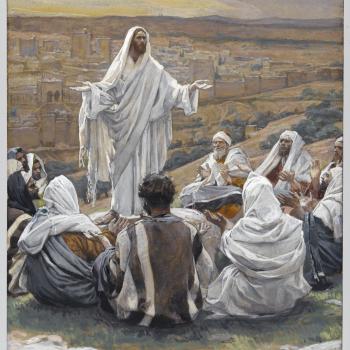Truth, it seems, has fallen on hard times. I Googled “truth” and the first entry was an anti-smoking information website, and “truth” was trademarked. Truth, like so much else in our materialistic world, has become a commercial property.
Within the context of a website like Patheos, the issue of truth is even more exigent. Here we offer a palette of religious beliefs, practices, expressions, and histories. A seeker can peruse a wild array of creation accounts, salvation stories, devotional practices, and declarations of deity. Or deities. Or the absence of deity. And apart from the rather outdated question of truth, they could all be right at the same time.
I remember several years back when the Dalai Lama was in town. He visited the DU campus, and that Saturday morning I drove by the auditorium where he was going to address the audience. The line to get in was blocks long. The following morning, I read a reporter’s account of speaking with some of those who showed up to hear the Dalai Lama.
One woman had brought her children, and in answering the reporter’s query about her interest, responded that she was trying to expose her children to a variety of religious expressions so they could make educated decisions about which tradition they would choose to practice as adults. Another in the line, an older man, said that he was a Roman Catholic, but that he found the Dalai Lama’s Buddhism appealing. Nevertheless, he said, he was too old to change and besides, his religion was rich and satisfying to him.
I think of this often. I wonder about the role of truth in religious faith. Does it really matter if the story is true? Some, of course, find truth irrelevant to religious beliefs. These are the ones for whom pluralism has become not merely an epistemological reality of our time, but an ideology in itself. These often ballyhoo the old story about the blind men trying to figure out the size and shape of the elephant. It’s all true. Or none of it is true. Whatever. Such pluralism has itself become part of the religious belief system. We pick the tradition that pleases us the most. For some of this, we can thank David Hume.
This, of course, simplifies tolerance and respect. You have your way and I have mine. You talk about your prophet or buddha or avatara, and I talk about mine. And we both smile and nod and concede not just their equality or compatibility, but their essential unity.
Others, however, still cling to the possibility of truth. Muhammad is the Prophet of God. Or he isn’t. Nature has a Goddess-essence. Or it doesn’t. Joseph Smith did find the golden plates through Moroni’s direction. Or it’s all a fabrication. Jesus did rise from the dead. Or his body remained in the grave. There is no god, no spirit, no supernatural reality. Or there is. Such truth-believers may or may not find their faith rich and satisfying even some of the time, but deep down they are convinced (most of the time) that what they believe is true, all of the time. (After all, faith and doubt need not be mutually exclusive…but that is perhaps another blog.)
Unfortunately, religious truth claims of all kinds have been too embedded in political and cultural identities, and thus throughout history have aided and abetted non-spiritual agendas, many of which have crippled and destroyed individuals, people groups, and entire nations. Truth, for some, is like a WMD that should be neutralized lest it ignite further desolation.
Others, however, struggle to harness the explosive power of truth for good and believe that the pursuit of this goal can be infused with gentleness and respect and forbearance. Some remain convinced that truth itself may be the key to the dire dilemmas of the human race, and that without it, without the authentic search for it, we relinquish an essential part of our humanity. Some core part of us dies.
-Kmulhern













